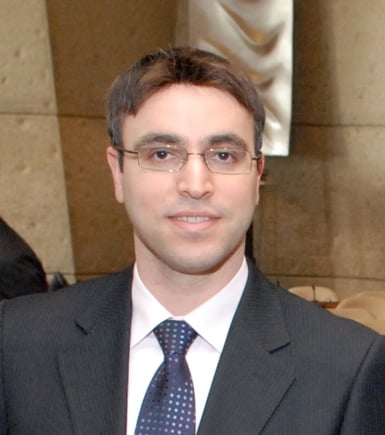While designers and apps writers rack their brains to create more novel ways for you to pay your bills and shop for more things you don’t really need (or really want) with your smartphone, a research team at the Technion-Israel Institute of Technology are doing something both unique and of true value. Headed by Professor Hossam Haick, the consortium is developing a device that teams with a smartphone. Once combined, the pair will be able analyze a speaker’s breath and detect existing or impending diseases.
Called the SNIFFPHONE, the device employs both micro- and nano-sensors that read exhaled breath and transfer information about breath content via the mobile phone to an information-processing system for interpretation. Analysis of breath data then enables a diagnosis.

Professor Hossam Haick
According to Professor Haick, “The SNIFFPHONE is a winning solution. It will be tinier and cheaper than currently available disease detection solutions, consume little power, and most importantly, it will enable immediate and early diagnosis that is both accurate and non-invasive. Early diagnosis can save lives, particularly in life-threatening diseases such as cancer.” Also noteworthy, the technology can identify individuals who may have a higher likelihood for contracting a specific disease and perhaps treat them in advance or at an earlier stage of the illness.
It was not all that long ago that a rather large, floor standing system with a breath-analyzing microphone attached could detect if someone breathing on the microphone had stomach ulcers or not. This system required some heavy-duty power sources, cost several hundred thousand dollars, and was a one-trick pony, meaning it could detect only ulcers. Now here’s a soon to be available handheld unit that may cost a couple hundred dollars at best and has the potential to detect numerous diseases. It’s like having half a doctor with a test lab that makes house calls no less!
Funded by a grant from the European Commission, the SNIFFPHONE project will provide non-invasive, fast, and inexpensive disease detection. Participants in the consortium include Siemens; universities and research institutes from Germany, Austria, Finland, Ireland and Latvia; and Israeli company NanoVation-GS Israel. NanoVation-GS is a Technion spin-off headed by Dr. Gregory Shuster and Sagi Gliksman, who are both graduates of Prof. Haick's laboratory. Prof. Haick serves as Chief Scientific Officer and is a member of the Technion Faculty of Chemical Engineering and a researcher at the Technion's Russell Berrie Nanotechnology Institute. For more details, visit http://www.ats.org